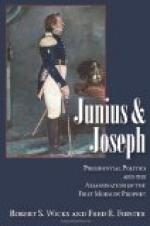There was a sudden change of attitude and voice. The lad saw that the man on the grass sat up, and as if he had received an answer, spoke in reply, not now in wailing supplication, but in quick whispered argument. The lad cowered with a fresh thrill of ghostly terror which burned the mad words into his memory.
“The loss would be to thee of the fairest of thine handmaids, and to her of her own soul, and to me—” but here the words of irritable contention failed in deep choking sobs. Then, to the lad’s perfect dismay, the black figure bounded to its feet and the arms were flung about in the darkness as if wrestling with an unseen enemy. Now, being desperate, the lad darted forth from his nook; passing in tip-toe rush at the back of this struggling figure, he sped home in his gust of fear, and, with the fantastic secrecy of youth, did not tell what he had heard and seen till years had come and gone.
CHAPTER XVII.
The May morning was wreathing itself with opening flowers to meet the first hour of sunlight when Susannah was startled by hearing that the prophet inquired for her. There was in the house where she lived an empty chamber, unfurnished because of poverty; it was in this that the prophet, who demanded a private audience, awaited her.
So vexed was she at the public advertisement which he had made of her, that she forgot the bereavement she had suffered since she last saw him; but when she looked up she saw that Smith’s face wore signs of emotion that he was not trying to conceal.
At first he made an attempt at some unctuous form of address, an effort at formality, a mechanical tribute to habit. Failing to finish his phrase, he stood before her, not as the lauded leader, not as the interesting martyr, but claiming recognition merely as a man, a large, coarse man feeling his own coarseness in her presence, a sinful man feeling his own sinfulness, but at the same time a man with a warm heart, which was now so beating with emotions of shame and pity and glad recognition that at first he could not speak, could not raise his eyes to hers until the warmth of his feeling rid him of self-consciousness.
Susannah had not expected to awake this emotion. She desired nothing less than condolence; and yet she was touched by seeing his huge strength broken down for the moment by her appearing. When he spoke his voice was hoarse.
“I—I told him—it was my earnest command to him not to go where there was danger.”
Halsey’s name was not spoken, but all through that interview Smith appeared to be haunted by his presence. “He was the best man amongst us,” he said.
“My husband is gone.” Susannah hoped by the reticence of her tone to ward off further excess of sympathy. “I am no longer bound to your Church, Mr. Smith. I should not be honest if I did not tell you that I hold myself free.”
He faced her frankly, but with a glance of searching pain. “It must seem a rather poor trade I’ve chosen if there ain’t no truth in it.”




